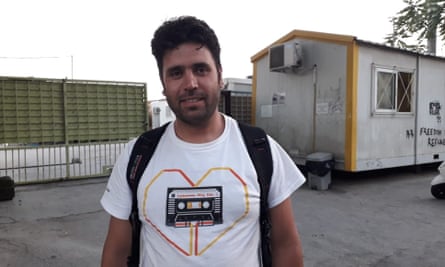The only refugee camp in Athens is barely a mile south-west of the Acropolis as the crow flies. Officials speak of Elaionas as a model reception centre, one that has blended decent living conditions with clockwork efficiency.
A collection of colourfully painted cabins, set either side of concrete pathways, Elaionas was built on former wasteland off the Sacred Way, ancient Greece’s oldest road. It opened in 2015, at the height of the refugee crisis. But in the rush to house families ordered to leave Moria, the infamous holding centre on Lesbos, authorities have turned the facility’s football ground into a tent city that has become synonymous with desperation and despair.
“We are 30 families in these nylon tents and there is no electricity and it is very, very hot,” says Murat Shahi, a burly father of four, explaining how the new arrivals are forced to spend “every hour of every day” looking for respite from the sun. “They say ‘leave Moria’, they stop our cash card, but I have no work, I don’t speak Greek. How can I find a home?”
The former teacher lies awake at night wondering how he will feed and house his children. “In Afghanistan I’m a dead man. I made this journey for a better life. Moria was very bad but then they moved me to a place where I receive no breakfast, no lunch. Why? I’m human with feelings.”
Mobin Azimi, in the next tent, arrived with his wife and two daughters from Lesbos. Food is a problem because there is never enough. At night women try to cook over a fire of sticks on top of terracotta bricks. “In Moria we had electricity but here it is very difficult to cook. I can control my hunger but what do you say to a child who can’t?” the furniture maker asks.
The scenes in Elaionas are replicated at the Skaramangas and Schisto reception centres on the outskirts of the Greek capital. People are told to fend for themselves after being accepted for asylum.
“When you get a blue card [as a protected refugee] everything stops,” says Azimi, who has spent weeks scouring Athens for a flat to rent.

“Other people in Elaionas, who haven’t got asylum, live in containers with electricity and air-conditioning. It’s crazy but they are in a much better situation. In Moria there was a lot of fighting. Here there is peace but life is so difficult,” he says.
The plight of refugees forced to leave camps as the centre-right government tries to ease the pressures on a vastly overcrowded reception system has led to growing concern. Volunteers working with refugees speak of hunger and dehydration. Yet Greece currently chairs the Council of Europe, the EU’s leading human rights organisation.
Around 11,000 people who were granted asylum since entering Greece have been asked to leave managed accommodation in island camps, hotels and apartments under the Estia scheme run by the UN refugee agency.
Citing the need to free up space in migrant facilities, officials describe the exit strategy as the long overdue “shock” that will shake the system into action.
Families have ended up in the street in Athens, gathering under the mulberry trees in Victoria Square. Critics claim Greece’s problem-plagued migration system is simply not up to the job.
“The problem is there is no system to shock, it’s so disorganised, so dysfunctional, it’s like trying to reboot a broken PC,” says Lefteris Papagiannakis, the former vice-mayor of Athens who helped set up Elaionas. “So these poor people, who should have been integrated long ago, end up on the street, collateral damage in a system whose solution will be to move them from one camp to another before they are moved again.”
This summer, about 1,600 refugees have arrived in Athens from Lesbos, mainly Afghans.
Among those recently transferred from Victoria Square to Schisto with her husband and baby daughter is Somayeh Hashemi. “It’s very cramped. We are many families but they have put us in the cinema room and not in a tent,” she said through her husband, Saeed. “Now we are sleeping on the floor but we worry about the future. We don’t have a tax number or a bank account. We don’t speak the language. How will we find a home?”
Since Greece’s prime minister Kyriakos Mitsotakis assumed power on a tough law and order platform, integration “even as a word” had barely been mentioned, says Papagiannakis, who now works for the humanitarian organisation, Solidarity Now.
“The rationale would seem to be to get them out of the camps, out of the system and push them politely out of Greece because once they have papers they are free to travel abroad and, as we know, most never come back.”

Although the flow of arrivals has been reduced dramatically by reinforced land and sea border patrols, a surge is expected later this year when coronavirus restrictions are relaxed in Turkey.
The International Organization for Migration (IOM) concedes there are problems. “We are dealing with a system that got up and running late,” its mission chief, Gianluca Rocco, says. “All this time there have not been regular exits [from camps] and now we’re seeing big groups leaving all at once and that is creating challenges.”
Among the lucky few is Laila Mohammadi, from Kabul, who found a home “by chance and in minutes”. She had enough money to pay the deposit with the monthly cash instalments she, her mother and seven siblings had been given in Moria.
“I was out looking at this little house when the police came and put my mother and brothers and sisters on the bus for Elaionas,” says the 24–year-old. “My mother called and I went straight there. After 20 minutes completing documents the staff said ‘you can go’. I told them I had found a house with a little garden and it was our dream home.”
